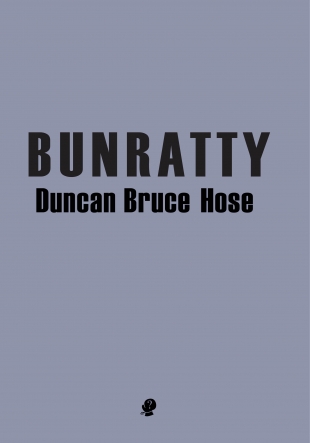 An abundance of impudence
An abundance of impudence
Bunratty by Duncan Hose
Puncher & Wattmann, 2016
The bio of Duncan Bruce Hose describes the Australian poet as coming from ‘the softslang line of the chansonnier, whose reference points range between Trefoil Island, Melbourne and Coney Island.’ In Bunratty, his third collection, that ‘softslang line’ delivers a suite of deftly composed (post)modernist folk songs, characterised by a highly idiosyncratic orthography and a preoccupation with sex and booze. Such treatment, in combination with Hose’s vernacular prosody, recalls in equal measure Middle English poetry and early twentieth century writers including Joyce. Many of Hose’s lines could almost be Chaucer, in the same way as Bunting or Eliot:
Old Prick of Sea-iron, I suck my gravey sauce at the Hero of Waterloo & Think On Trefoil Island (‘Cork Butter Exchange and Reed Band’)
In this poem, there are also some of Hose’s cummingsesque approaches to loosening the verve of the voice by way of disregard for case, spelling and punctuation, while relaying a swarm of physical details:
Sometimes i suspect my amourofauna, the smalle cell-people, the ones who share my cigarettes Bacteria Barterium Who are supposed to love me but are quietly eating me I am the feast The sacrifice the beautiful bull bits, teats, torso, the head spit in twain My humour chuckles down the steps Of the temple I want you to love me baby, now that we have burned off the smut so to Sprach. As the goat with the fangled horns I donate the art Of getting at one’s own behind. (‘Cork Butter Exchange and Reed Band’)
The body and the bodily feature large in this book, while disruption and reinvention of punctuation and case yield a surprisingly consistent visual presentation of the speaker’s voice.
Much of Bunratty takes place in Ireland, as the title might suggest to those familiar with the village and castle of the same name, though it also jumps the Atlantic at times, as well as finding time to touch regional Australia. At each stop the same voice of folk balladeering is with us, mixing topics and dialects in ways those traditions encourage, inflected further with a postmodern self-awareness of the arbitrariness of meaning.
Never Ones’to keep except in a failbrace like a poem’s
Collisions and collixions of dirty code
‘Pishouge’ the casting of the curse Pithougue the dandy man
Never make that mistaken agin
Toog an Tooboogie a fresh saying of no comport except the taste of
its own wreckish
seeds
Pomegranite Barbituate
Today I made myself Mayour of Merimb ula, tomorrow it shall be
Broulee
(‘Oedipus Rex’)
This mix of simulated accents and obscure words combined with sometimes willful misspellings, shorthand abbreviations and distortions create an intriguing, trans-historical voice. Hose manages to find some common ground between the eras, too – the voice not of the street but of the gutter, the inner voice of the over-sexed drifter.
For example, the substantial set of shanties (or chantey, as Hose sometimes spells it) that provides the most self-sustaining section of the book, are rife not only with lines about the body, but also with bizarre slips of innuendo (and blatant blasts of exuendo) that would seem coincidental if not for their prevalence. These modernist folk songs plunder a range of regional and rural settings, and pile on the singing of the body that until now has been merely commonplace in the book.
Hose sets the tone for the chanties early. The second and third stanzas of ‘Golden leaflets of shoji’ demonstrate a typical segue from marvelling at the viscera where emotional responses emanate and resonate, to pondering sexual desire as physical impulse:
soft-tiered ruffles that is my digestion stunning!
Goat-packed hollows bearded éclair what made you want to bit
Exactly your lip
Pressing a cache of blood just there
Il tremblant a lot,
Only because of friction of the thought of what of
Whatever is squalid in your pants
The blackbird sees!
Blackbirds squabbling in your pants
I most follow you in the exhalation of Abbottsford dew
(it does not tremble)
The chanteys themselves include songs about sex as epic adventure (‘New England Clam Chowder’), spring fecundity and arousal (‘Lamb Chantey’), risking everything for pleasure (‘Lobster Chantey’), lusting after anonymous drunk women (‘Pembroke Chantey’), adoration for various genitalia (‘Charm of a bivalve Chantey’), masturbation (‘Hand Cramp Shantey.’), whaling as a sexually energising adventure (‘Pea and Cream Shantey’), bestiality – possibly – or animal husbandry, or else some other sexually charged, alcohol-enhanced bucolic practices (‘Horse Meat Shantie’), getting drunk while aroused in a private saturnalia (‘Can of Spam Chantey.’), drug-induced delirium – though that’s perhaps the laziest attempt at interpreting a work of art in any form – (‘Crack- Rabbit Shantey’), and what appears to be a mediation on roaming drunk at a drag race (‘Drag Racing Chantey’).









